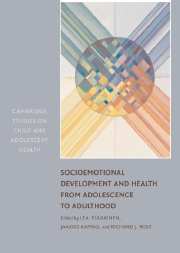Book contents
- Frontmatter
- Contents
- List of Contributors
- Preface
- Introduction
- PART I LONGITUDINAL AND BEHAVIORAL GENETIC APPROACHES
- PART II ADOLESCENT HEALTH-RELATED BEHAVIOR AND ADULT HEALTH
- PART III SOCIOEMOTIONAL BEHAVIOR IN EARLY ADOLESCENCE
- 8 Genetic and Environmental Factors in Girls' and Boys' Socioemotional Behavior
- 9 Emotion Regulation and Well-Being
- 10 Parental Knowledge and Family Atmosphere in Relation to Children's Socioemotional Behavior
- 11 Parental Work and Children's Behavior: The Mediator Roles of Partner Relationship and Parenthood
- 12 Grandparents as Resource Factors in the Family
- PART IV LIFE COURSE AND HEALTH
- Summary and Future Directions
- References
- Author Index
- Subject Index
10 - Parental Knowledge and Family Atmosphere in Relation to Children's Socioemotional Behavior
Published online by Cambridge University Press: 07 December 2009
- Frontmatter
- Contents
- List of Contributors
- Preface
- Introduction
- PART I LONGITUDINAL AND BEHAVIORAL GENETIC APPROACHES
- PART II ADOLESCENT HEALTH-RELATED BEHAVIOR AND ADULT HEALTH
- PART III SOCIOEMOTIONAL BEHAVIOR IN EARLY ADOLESCENCE
- 8 Genetic and Environmental Factors in Girls' and Boys' Socioemotional Behavior
- 9 Emotion Regulation and Well-Being
- 10 Parental Knowledge and Family Atmosphere in Relation to Children's Socioemotional Behavior
- 11 Parental Work and Children's Behavior: The Mediator Roles of Partner Relationship and Parenthood
- 12 Grandparents as Resource Factors in the Family
- PART IV LIFE COURSE AND HEALTH
- Summary and Future Directions
- References
- Author Index
- Subject Index
Summary
INTRODUCTION
The central goal of parenting is to socialize children to conform to the demands of society while helping them to develop and maintain a sense of personal integrity and autonomy (Baumrind, 1971). Although the specific characteristics, skills, and knowledge considered desirable in children vary from one culture to another, there is general agreement that children should be reared to become adults who are mentally and physically healthy, are productive at work, and have the ability to form relationships with other people (Maccoby & Martin, 1983). Parents are not the only socialization agents that contribute to the development of children, but they are considered central sources of influence (Collins, Maccoby, Steinberg, Hetherington, & Bornstein, 2000).
The goal of this chapter is to present research findings on parenting and child development, based on the Jyväskylä Longitudinal Study of Personality and Social Development (JYLS). First, we summarize earlier JYLS findings demonstrating the role of parenting and family circumstances in the development of children. Second, we focus on the challenge of conceptualization and measurement of parenting. In this connection, we present approaches used in the JYLS to determine the quality of parenting. We also describe recent results that concern the selection of the informant and parental personality characteristics as the source of variation in parenting. Finally, we further elaborate the issue of measurement of parenting by linking multi-informant data on parenting to child socialization.
- Type
- Chapter
- Information
- Publisher: Cambridge University PressPrint publication year: 2006
- 1
- Cited by



